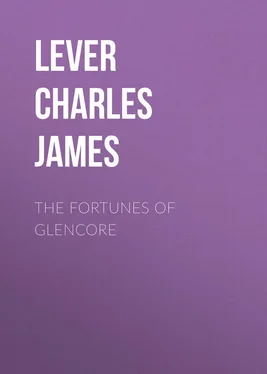Charles Lever - The Fortunes Of Glencore
Здесь есть возможность читать онлайн «Charles Lever - The Fortunes Of Glencore» — ознакомительный отрывок электронной книги совершенно бесплатно, а после прочтения отрывка купить полную версию. В некоторых случаях можно слушать аудио, скачать через торрент в формате fb2 и присутствует краткое содержание. Жанр: literature_19, foreign_antique, foreign_prose, на английском языке. Описание произведения, (предисловие) а так же отзывы посетителей доступны на портале библиотеки ЛибКат.
- Название:The Fortunes Of Glencore
- Автор:
- Жанр:
- Год:неизвестен
- ISBN:нет данных
- Рейтинг книги:4 / 5. Голосов: 1
-
Избранное:Добавить в избранное
- Отзывы:
-
Ваша оценка:
- 80
- 1
- 2
- 3
- 4
- 5
The Fortunes Of Glencore: краткое содержание, описание и аннотация
Предлагаем к чтению аннотацию, описание, краткое содержание или предисловие (зависит от того, что написал сам автор книги «The Fortunes Of Glencore»). Если вы не нашли необходимую информацию о книге — напишите в комментариях, мы постараемся отыскать её.
The Fortunes Of Glencore — читать онлайн ознакомительный отрывок
Ниже представлен текст книги, разбитый по страницам. Система сохранения места последней прочитанной страницы, позволяет с удобством читать онлайн бесплатно книгу «The Fortunes Of Glencore», без необходимости каждый раз заново искать на чём Вы остановились. Поставьте закладку, и сможете в любой момент перейти на страницу, на которой закончили чтение.
Интервал:
Закладка:
“And is he full of miseries at the dreary place, the rough fare and deplorable resources of this wild spot?”
“Quite the reverse; he is charmed with everything and everybody. The view from his window is glorious; the air has already invigorated him. For years he has not breakfasted with the same appetite; and he finds that of all the places he has ever chanced upon, this is the one veritable exact spot which suits him.”
“This is very kind on his part,” said Glencore, with a faint smile. “Will the humor last, Harcourt? That is the question.”
“I trust it will, – at least it may well endure for the short period he means to stay; although already he has extended that, and intends remaining till next week.”
“Better still,” said Glencore, with more animation of voice and manner. “I was already growing nervous about the brief space in which I was to crowd in all that I want to say to him; but if he will consent to wait a day or two, I hope I shall be equal to it.”
“In his present mood there is no impatience to be off; on the contrary, he has been inquiring as to all the available means of locomotion, and by what convenience he is to make various sea and land excursions.”
“We have no carriage, – we have no roads, even,” said Glencore, peevishly.
“He knows all that; but he is concerting measures about a certain turf-kish, I think they call it, which, by the aid of pillows to lie on, and donkeys to drag, can be made a most useful vehicle; while, for longer excursions, he has suggested a ‘conveniency’ of wheels and axles to the punt, rendering it equally eligible on land or water. Then he has been designing great improvements in horticulture, and giving orders about a rake, a spade, and a hoe for himself. I ‘m quite serious,” said Harcourt, as Glencore smiled with a kind of droll incredulity. “It is perfectly true; and as he hears that the messenger occasionally crosses the lough to the post, when there are no letters there, he hints at a little simple telegraph for Leenane, which should announce what the mail contains, and which might be made useful to convey other intelligence. In fact, all my changes here will be as for nothing to his reforms, and between us you ‘ll not know your own house again, if you even be able to live in it.”
“You have already done much to make it more habitable, Harcourt,” said Glencore, feelingly; “and if I had not the grace to thank you for it, I ‘m not the less grateful. To say truth, my old friend, I half doubted whether it was an act of friendship to attach me ever so lightly to a life of which I am well weary. Ceasing as I have done for years back to feel interest in anything, I dread whatever may again recall me to the world of hopes and fears, – that agitated sea of passion wherein I have no longer vigor to contend. To speak to me, then, of plans to carry out, schemes to accomplish, was to point to a future of activity and exertion; and!” – here he dropped his voice to a deep and mournful tone – “can have but one future, – the dark and dreary one before the grave!”
Harcourt was too deeply impressed by the solemnity of these words to venture on a reply, and he sat silently contemplating the sorrow-struck but placid features of the sick man.
“There is nothing to prevent a man struggling, and successfully too, against mere adverse fortune,” continued Glencore. “I feel at times that if I had been suddenly reduced to actual beggary, – left without a shilling in the world, – there are many ways in which I could eke out subsistence. A great defeat to my personal ambition I could resist. The casualty that should exclude me from a proud position and public life, I could bear up against with patience, and I hope with dignity. Loss of fortune, loss of influence, loss of station, loss of health even, dearer than them all, can be borne. There is but one intolerable ill, one that no time alleviates, no casuistry diminishes, – loss of honor! Ay, Harcourt, rank and riches do little for him who feels himself the inferior of the meanest that elbows him in a crowd; and the man whose name is a scoff and a jibe has but one part to fill, – to make himself forgotten.”
“I hope I ‘m not deficient in a sense of personal honor, Glencore,” said Harcourt; “but I must say that I think your reasoning on this point is untenable and wrong.”
“Let us not speak more of it,” said Glencore, faintly. “I know not how I have been led to allude to what it is better to bear in secret than to confide even to friendship;” and he pressed the strong fingers of the other as he spoke, in his own feeble grasp. “Leave me now, Harcourt, and send Upton here. It may be that the time is come when I shall be able to speak to him.”
“You are too weak to-day, Glencore, – too much agitated. Pray defer this interview.”
“No, Harcourt; these are my moments of strength. The little energy now left to me is the fruit of strong excitement. Heaven knows how I shall be to-morrow.”
Harcourt made no further opposition, but left the room in search of Upton.
It was full an hour later when Sir Horace Upton made his appearance in Glencore’s chamber, attired in a purple dressing-gown, profusely braided with gold, loose trousers as richly brocaded, and a pair of real Turkish slippers, resplendent with costly embroidery; a small fez of blue velvet, with a deep gold tassel, covered the top of his head, at either side of which his soft silky hair descended in long massy waves, apparently negligently, but in reality arranged with all the artistic regard to effect of a consummate master. From the gold girdle at his waist depended a watch, a bunch of keys, a Turkish purse, an embroidered tobacco-bag, a gorgeously chased smelling-bottle, and a small stiletto, with a topaz handle. In one hand he carried a meerschaum, the other leaned upon a cane, and with all the dependence of one who could not walk without its aid. The greeting was cordial and affectionate on both sides; and when Sir Horace, after a variety of preparations to ensure his comfort, at length seated himself beside the bed, his features beamed with all their wonted gentleness and kindness.
“I’m charmed at what Harcourt has been telling me, Upton,” said Glencore; “and that you really can exist in all the savagery of this wild spot.”
“I’m in ecstasy with the place, Glencore. My memory cannot recall the same sensations of health and vigor I have experienced since I came here. Your cook is first-rate; your fare is exquisite; the quiet is a positive blessing; and that queer creature, your doctor, is a very remarkable genius.”
“So he is,” said Glencore, gravely.
“One of those men of original mould who leave cultivation leagues behind, and arrive at truth by a bound.”
“He certainly treated me with considerable skill.”
“I’m satisfied of it; his conversation is replete with shrewd and intelligent observation, and he seems to have studied his art more like a philosopher than a mere physician of the schools. And depend upon it, Glencore, the curative art must mainly depend upon the secret instinct which divines the malady, less by the rigid rules of acquired skill than by that prerogative of genius, which, however exerted, arrives at its goal at once. Our conversation had scarcely lasted a quarter of an hour, when he revealed to me the exact seat of all my sufferings, and the most perfect picture of my temperament. And then his suggestions as to treatment were all so reasonable, so well argued.”
“A clever fellow, no doubt of it,” said Glencore.
“But he is far more than that, Glencore. Cleverness is only a manufacturing quality, – that man supplies the raw article also. It has often struck me as very singular that such heads are not found in our class, – they belong to another order altogether. It is possible that the stimulus of necessity engenders the greatest of all efforts, calling to the operations of the mind the continued strain for contrivance; and thus do we find the most remarkable men are those, every step of whose knowledge has been gained with a struggle.”
Читать дальшеИнтервал:
Закладка:
Похожие книги на «The Fortunes Of Glencore»
Представляем Вашему вниманию похожие книги на «The Fortunes Of Glencore» списком для выбора. Мы отобрали схожую по названию и смыслу литературу в надежде предоставить читателям больше вариантов отыскать новые, интересные, ещё непрочитанные произведения.
Обсуждение, отзывы о книге «The Fortunes Of Glencore» и просто собственные мнения читателей. Оставьте ваши комментарии, напишите, что Вы думаете о произведении, его смысле или главных героях. Укажите что конкретно понравилось, а что нет, и почему Вы так считаете.












